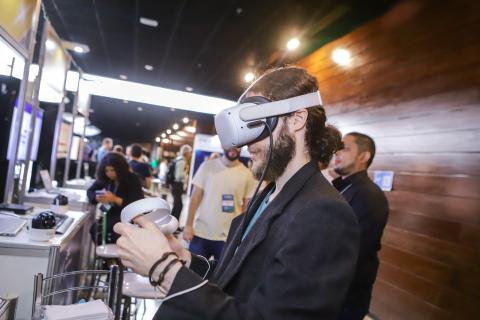Experts advocate more dialogue between companies and universities
“We cannot be a nation of technology consumers, we have to produce our own technology here in Brazil”. In his participation in the panel on Innovation, Entrepreneurship and Startups, on the second day of the WRNP, the head professor of the Institute of Computing at the Federal University of Amazonas (Ufam), Altigran Soares de Silva, came out in defense of a greater relationship between universities and companies.
The panel was mediated by RNP's Research, Development and Innovation advisor, José Henrique Dieguez. The head of Open Innovation and Corporate Venture Capital at ACE Cortex, Amanda Coutinho, and RNP's Research and Development manager, André Luiz Marins, also participated in the table. In focus, the search for strategies to increase synergies between universities and companies.
The Ufam professor defended that this dialogue needs to be expanded in favor of the country's development. For Soares de Silva, Brazilian companies are increasingly interested in creating long-term sustainable businesses and accessing venture capital resources. They also need computing professionals with backgrounds, cutting-edge computing solutions to real problems, and a long-term view of technology – specialists that can be found in academia.
“When we at university engage with companies, we have access to real-world user data and analytics that we wouldn't have in academia. If we partner with those who have this data, we will understand much better what needs to be done and, with that, develop the country”, emphasized the professor.
Amanda Coutinho also advocates a greater degree of interaction between universities and companies. The executive presented research from Stanford University showing that, in the United States, there is three times more chance of a startup founder being successful if he has a master's degree. And 20% less chance of being successful in the field if you don't have a college degree.
“We are used to thinking of entrepreneurs in the shape of Mark Zuckerberg, who dropped out of Harvard to found Facebook. But what we have seen is the opposite of that. Advancing in Academia is very well seen by investors and signals that the product has technical robustness”, she highlighted.
Amanda Coutinho also demystified the idea that startups created in universities would not be valued. The executive cited recent research that shows that, from 1990 to 2016, there were more than 400 exits, sales of startups born in laboratories from universities around the world. Numbers that, according to her, prove that the academic trajectory is taken into account. “The researcher is an extremely resilient being and to be a startup also needs to be resilient”, she concluded with good humor, followed by laughter from the audience.
RNP present throughout the innovation journey
André Luiz Marins spoke about RNP's role in the journey of entrepreneurship and innovation in Brazil. “RNP works with connections. We have a historic relationship with Academia, with students who become founders of startups, and with the startups themselves who become established companies”.
José Henrique Dieguez presented RNP's partnership strategies with startups, in five progressive levels: from the initial offer of a solution to entry as a partner in the new business. The RD&I advisor brought examples of RNP programs in which the organization acts as a developer and experimenter, such as OpenRAN@Brasil and Hackers do Bem.
INOVA Stage
Entrepreneurship and innovation were present throughout the WRNP on the INOVA stage. The parallel programming of the Workshop presented the results of the Working Groups of the Advanced Services PD&I Program and other cutting-edge solutions supported by RNP.
Among the innovations shown were Tutoria, which uses artificial intelligence to help university professors correct student activities and tests, and Metahealth, a platform to train students and health professionals in immersive simulators.
Access the playlist with the INOVA stage presentations and all WRNP video content.

Foto: Eduardo Tadeu / Divulgação RNP
